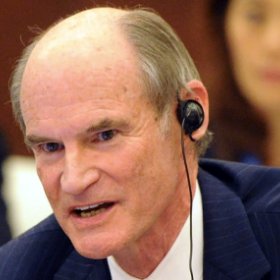
McConnell on Russian Cyber Meddling
EWI Global Vice President Bruce McConnell talks to Voice of America about allegations of Russian cyber meddling to influence the U.S. elections this year.
"I think it was a surprise to everyone that this tactic was used, we haven't seen that in the U.S. before although certainly misinformation is often promulgated and compromising information is often put out around the world on lots of things. But it was surprising for most of us, I think, to see it done in the election in such a blatant way," said McConnell, who leads EWI's Global Cooperation in Cyberspace Initiative.
He said: "There are two kinds of companies, two kinds of organizations. Those that have been hacked and those that know they've been hacked. So it's better to be in the second group, you can then try to fix it or at least recover from it. But in general, anybody who has valuable information online and has any public profile is subject to various kinds of cyber attacks."
McConnell, who was U.S. Deputy Under Secretary for Cybersecurity in 2013 and also served on the Commission on Cybersecurity for the 44th Presidency, added: "When you get to national security secrets and classified information, most of those systems, at least in the United States, are not directly connected to the internet and they run on their own networks so there's some more protection. But in those cases, of course, we've seen the danger from the insider's threat."
According to reports, the CIA has judged that the Russian cyber attacks, including the hacking of emails from the Democratic National Committee, were intended to influence the election in Donald Trump’s favor. President-elect Trump has dismissed these allegations against Russia.
"Attribution can be hard in cyber attacks. I think that attribution problem has been increasingly solved, not only in these cases. In this one, for example, there's not only the forensic evidence, the cyber evidence including the way the attacks were done in comparison to other kinds of attacks. But I'm sure the intelligence community had other evidence, non-cyber evidence that they used to corroborate their findings. Otherwise you wouldn't have found such a unanimous point of view on this particular attribution," said McConnell.
The full interview can be accessed here.

